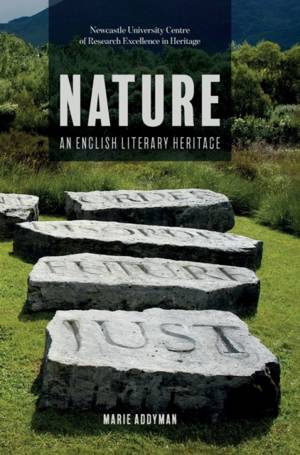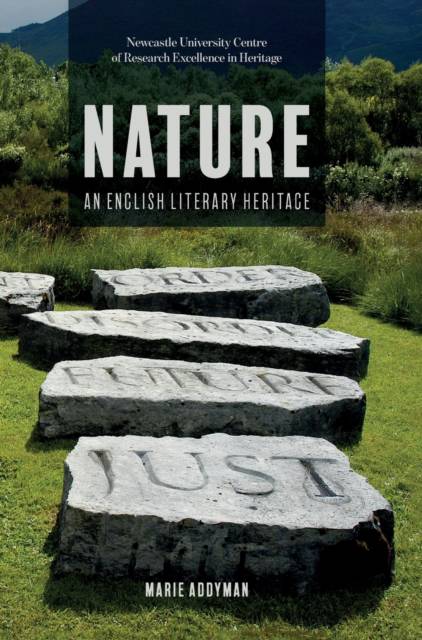
- Retrait gratuit dans votre magasin Club
- 7.000.000 titres dans notre catalogue
- Payer en toute sécurité
- Toujours un magasin près de chez vous
- Retrait gratuit dans votre magasin Club
- 7.000.000 titres dans notre catalogue
- Payer en toute sécurité
- Toujours un magasin près de chez vous
185,45 €
+ 370 points
Description
What might it mean to study ideas of nature within our English literary heritage? In posing this question this volume invites us both to discover a diversity of ways of looking at a major continuing topos within English literature, and to ask what we mean by nature itself within this context. Starting from the premise of considering the pathetic fallacy which demands that nature reflects our emotional needs and beliefs as well as providing our material sustenance, the author explores the astonishing variety of themes grouped under the banner of "nature writing". Some chapters consider the broad distinctions of nature experienced as time and mortality for human beings, and nature perceived as "out there" in the local or larger environment; others demonstrate how nature is commandeered in the erotic pastoral lyrics of the Elizabethan sonneteers, how the concept of a "natural" family underpins the tragedy of King Lear, and how definitions of what is natural are used to validate dominion over women and animals as well as the earth itself.
A literary heritage of nature is here envisaged as a polyphony of voices across the centuries in which English texts influence and are influenced by their continental and North American fellow-artists. The colonial preoccupations of the Elizabethan Sir Walter Ralegh are re-examined in the writings of the American nineteenth-century defender of nature David Henry Thoreau. The seventeenth-century Norfolk physician Sir Thomas Browne's musings begin and end the meditations by W.G. Sebald on his twentieth-century East Anglian pilgrimage in The Rings of Saturn. Mary Shelley's new genre of science fiction is turned upside down in Italo Calvino's Cosmicomics. Ted Hughes translates Ovid. Seamus Heaney takes his inspiration from English, Irish and continental peers and predecessors.
This polyphonic chorus of writing about nature has always enriched our literature and continues to do so. At the same it demonstrates how we have naturalised nature in our culture, as both a celebration, and an admonishment for what we take for granted in our attitudes to the natural world.
MARIE ADDYMAN is an independent scholar whose writing and teaching reflects the interdisciplinary approach which is fundamental to her practice. While guest-lecturing on English literature and women's studies at various English universities, she has taught literature, history, and history of medicine for the Open University.
A literary heritage of nature is here envisaged as a polyphony of voices across the centuries in which English texts influence and are influenced by their continental and North American fellow-artists. The colonial preoccupations of the Elizabethan Sir Walter Ralegh are re-examined in the writings of the American nineteenth-century defender of nature David Henry Thoreau. The seventeenth-century Norfolk physician Sir Thomas Browne's musings begin and end the meditations by W.G. Sebald on his twentieth-century East Anglian pilgrimage in The Rings of Saturn. Mary Shelley's new genre of science fiction is turned upside down in Italo Calvino's Cosmicomics. Ted Hughes translates Ovid. Seamus Heaney takes his inspiration from English, Irish and continental peers and predecessors.
This polyphonic chorus of writing about nature has always enriched our literature and continues to do so. At the same it demonstrates how we have naturalised nature in our culture, as both a celebration, and an admonishment for what we take for granted in our attitudes to the natural world.
MARIE ADDYMAN is an independent scholar whose writing and teaching reflects the interdisciplinary approach which is fundamental to her practice. While guest-lecturing on English literature and women's studies at various English universities, she has taught literature, history, and history of medicine for the Open University.
Spécifications
Parties prenantes
- Auteur(s) :
- Editeur:
Contenu
- Nombre de pages :
- 368
- Langue:
- Anglais
- Collection :
- Tome:
- n° 23
Caractéristiques
- EAN:
- 9781843846024
- Date de parution :
- 18-06-21
- Format:
- Livre relié
- Format numérique:
- Genaaid
- Dimensions :
- 170 mm x 244 mm
- Poids :
- 780 g







